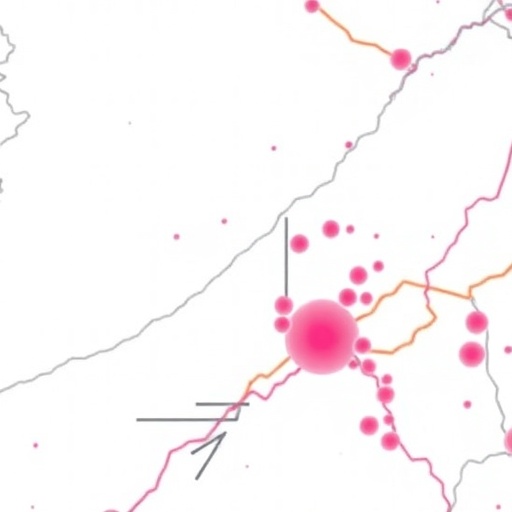In a groundbreaking study heralded as a major step forward in microbial genomics, a team of researchers has successfully established the first whole-genome sequence of Mycobacterium avium subsp. silvaticum, a pathogen that has been isolated from a diseased Egyptian goose (Alopochen aegyptiaca). This research not only enhances the understanding of the genetic makeup of this particular mycobacterium but also raises concerns about wildlife health and its implications for public health, conservation efforts, and veterinary science. The findings are set to be published in an upcoming issue of BMC Genomics in 2025.
Mycobacterium avium belongs to a complex of bacteria that are often associated with birds and have a notable impact on various species, including domestic animals and humans. The significance of sequencing the genome of M. avium subsp. silvaticum stems from its potential role in emerging infectious diseases that could affect wildlife populations and, potentially, humans. Researchers emphasized the urgency of understanding its genetics to devise appropriate strategies for monitoring and controlling the spread of this pathogen in natural habitats.
One of the major accomplishments of this study is the detailed characterization of the bacterium’s entire genome, which is pivotal for unraveling its biological capabilities. Whole-genome sequencing allows scientists to identify genetic markers associated with virulence and antibiotic resistance, which can inform both clinical practices and wildlife management strategies. By utilizing advanced sequencing technologies, researchers can uncover genetic variations that may contribute to the organism’s pathogenicity, behaviors, and evolutionary adaptations, illustrating the importance of genome analysis in modern microbiology.
The research highlights the laboratory methods employed, which included high-throughput sequencing techniques coupled with bioinformatics analysis. The collected data were subjected to rigorous computational assessments to ensure accuracy and reliability in identifying bacterial strains. This meticulous approach underscores the interplay between cutting-edge technology and biological research in understanding complex microbial genetics. The genome analysis revealed prominent gene clusters that could indicate how the pathogen survives and thrives in its host environment, showcasing the dynamic relationship between the organism and its ecological niche.
In light of the findings, researchers raised critical questions regarding the pathways through which M. avium subsp. silvaticum may enter domestic animal populations and, potentially, human communities. This pathogen is notable for its environmental persistence and can exist in various ecological niches, making it a candidate of concern for zoonotic transmission. Understanding the evolutionary trends and adaptive significance of the observed genomic features is essential for developing predictive models regarding its spread and impact on wildlife and human health.
Moreover, the researchers pointed out that their study is not solely an academic endeavor but carries significant implications for conservation biology. As wildlife species face increasing threats from habitat loss, climate change, and emerging diseases, insights gained from genomic studies can inform conservation strategies aimed at biodiversity protection. Knowing the infectious profiles of wildlife pathogens can assist in developing measures to safeguard endangered species and maintain ecosystem health, contributing to sustainable environmental practices.
As researchers prepare for this publication, they hope to engage a wider audience, inviting discussions about the interface of wildlife health, microbial genomics, and public health. The momentum generated by this research is expected to stimulate further investigations into other wildlife pathogens that may similarly bridge the gap between animal and human health, reinforcing the one health concept that recognizes the interconnectedness of health across species.
In summary, the sequencing of M. avium subsp. silvaticum marks a significant achievement in microbial genomics that addresses critical health concerns in wildlife and human populations. The detailed insights gleaned from the genome sequence will undoubtedly serve as a cornerstone for future research aimed at controlling infections and managing ecological health. As the research community grapples with emerging pathogens in a changing world, this study emphasizes the continued importance of genomic surveillance and proactive measures in understanding and mitigating the risks posed by infectious diseases.
The implications of this study extend beyond mere academic interest; they resonate through conservation efforts, veterinary practices, and public health policies. The potential zoonotic threat that M. avium subsp. silvaticum represents calls for an integrated approach to both wildlife research and management policies. As we forge ahead into uncharted territories of pathogen genomics, this research exemplifies the vital contributions that such studies can make in illuminating the complexities of life and health on our planet.
The future of wild and domestic animal healthcare will undoubtedly benefit from increased genomic understanding, allowing stakeholders to build more resilient ecosystems in the face of microbial threats. Such efforts are essential for ensuring the continued health of wildlife populations, which are crucial for maintaining biodiversity and ecosystem functionality.
The journey of understanding Mycobacterium avium subsp. silvaticum through its genome has only just begun, yet the real-world impacts of this research will last for years to come. We stand on the brink of a new era in understanding how microbial life shapes the world, and this study serves as a guiding beacon for those navigating this complex biological landscape.
As society continues to explore the intricacies of genomics, the mission remains clear: to harness knowledge for the betterment of health across all living beings, thereby fostering a more harmonious relationship between humans, animals, and the environment.
Subject of Research: Whole-genome sequencing of Mycobacterium avium subsp. silvaticum
Article Title: First whole-genome sequence of Mycobacterium avium subsp. silvaticum isolated from a diseased Egyptian goose (Alopochen aegyptiaca)
Article References: Barth, S.A., Peters, M., Mormann, S. et al. First whole-genome sequence of Mycobacterium avium subsp. silvaticum isolated from a diseased Egyptian goose (Alopochen aegyptiaca). BMC Genomics 26, 741 (2025). https://doi.org/10.1186/s12864-025-11893-3
Image Credits: AI Generated
DOI:
Keywords: Mycobacterium avium, whole-genome sequencing, wildlife health, zoonotic diseases, bacterial genomics, conservation biology, public health.
Tags: avian pathogens and wildlife healthBMC Genomics 2025 publicationconservation efforts and pathogen monitoringdisease impacts on domestic animalsemerging infectious diseases in wildlifegenetic characterization of bacteriagenetic makeup of Mycobacterium aviumgenomic research in veterinary sciencemicrobial genomics and disease controlMycobacterium avium subsp. silvaticumMycobacterium avium whole-genome sequencingpublic health implications of mycobacteria





